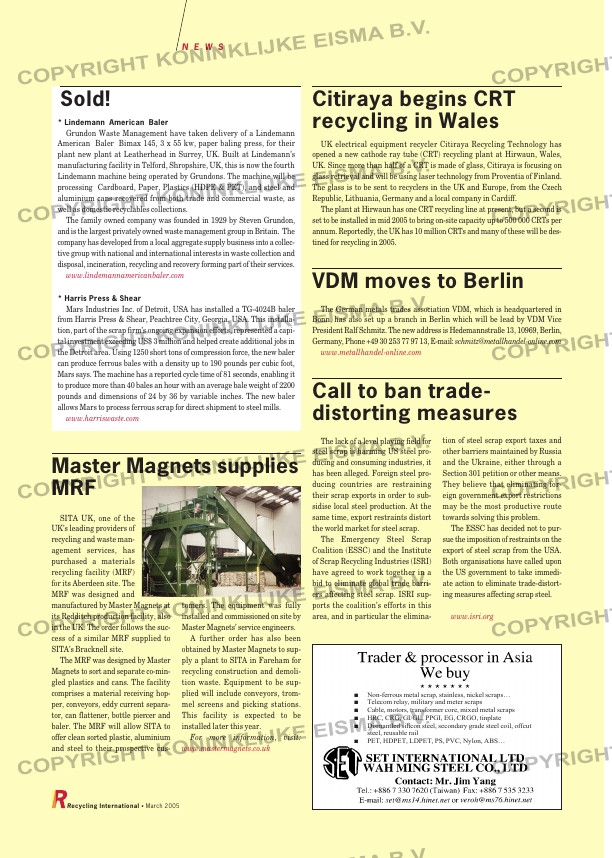Page 12 from: March 2005

N E W S
Recycling International • March 2005
■ Non-ferrous metal scrap, stainless, nickel scraps…
■ Telecom relay, military and meter scraps
■ Cable, motors, transformer core, mixed metal scraps
■ HRC, CRG, GI/GL, PPGI, EG, CRGO, tinplate
■ Dismantled silicon steel, secondary grade steel coil, offcut
steel, reusable rail
■ PET, HDPET, LDPET, PS, PVC, Nylon, ABS…
* Lindemann American Baler
Grundon Waste Management have taken delivery of a Lindemann
American Baler Bimax 145, 3 x 55 kw, paper baling press, for their
plant new plant at Leatherhead in Surrey, UK. Built at Lindemann’s
manufacturing facility in Telford, Shropshire, UK, this is now the fourth
Lindemann machine being operated by Grundons. The machine will be
processing Cardboard, Paper, Plastics (HDPE & PET), and steel and
aluminium cans recovered from both trade and commercial waste, as
well as domestic recyclables collections.
The family owned company was founded in 1929 by Steven Grundon,
and is the largest privately owned waste management group in Britain. The
company has developed from a local aggregate supply business into a collec-
tive group with national and international interests in waste collection and
disposal, incineration, recycling and recovery forming part of their services.
www.lindemannamericanbaler.com
* Harris Press & Shear
Mars Industries Inc. of Detroit, USA has installed a TG-4024B baler
from Harris Press & Shear, Peachtree City, Georgia, USA. This installa-
tion, part of the scrap firm’s ongoing expansion efforts, represented a capi-
tal investment exceeding US$ 3 million and helped create additional jobs in
the Detroit area. Using 1250 short tons of compression force, the new baler
can produce ferrous bales with a density up to 190 pounds per cubic foot,
Mars says. The machine has a reported cycle time of 81 seconds, enabling it
to produce more than 40 bales an hour with an average bale weight of 2200
pounds and dimensions of 24 by 36 by variable inches. The new baler
allows Mars to process ferrous scrap for direct shipment to steel mills.
www.harriswaste.com
Sold!
UK electrical equipment recycler Citiraya Recycling Technology has
opened a new cathode ray tube (CRT) recycling plant at Hirwaun, Wales,
UK. Since more than half of a CRT is made of glass, Citiraya is focusing on
glass retrieval and will be using laser technology from Proventia of Finland.
The glass is to be sent to recyclers in the UK and Europe, from the Czech
Republic, Lithuania, Germany and a local company in Cardiff.
The plant at Hirwaun has one CRT recycling line at present, but a second is
set to be installed in mid 2005 to bring on-site capacity up to 500 000 CRTs per
annum. Reportedly, the UK has 10 million CRTs and many of these will be des-
tined for recycling in 2005.
Citiraya begins CRT
recycling in Wales
SITA UK, one of the
UK’s leading providers of
recycling and waste man-
agement services, has
purchased a materials
recycling facility (MRF)
for its Aberdeen site. The
MRF was designed and
manufactured by Master Magnets at
its Redditch production facility, also
in the UK. The order follows the suc-
cess of a similar MRF supplied to
SITA’s Bracknell site.
The MRF was designed by Master
Magnets to sort and separate co-min-
gled plastics and cans. The facility
comprises a material receiving hop-
per, conveyors, eddy current separa-
tor, can flattener, bottle piercer and
baler. The MRF will allow SITA to
offer clean sorted plastic, aluminium
and steel to their prospective cus-
tomers. The equipment was fully
installed and commissioned on site by
Master Magnets’ service engineers.
A further order has also been
obtained by Master Magnets to sup-
ply a plant to SITA in Fareham for
recycling construction and demoli-
tion waste. Equipment to be sup-
plied will include conveyors, trom-
mel screens and picking stations.
This facility is expected to be
installed later this year.
For more information, visit:
www.mastermagnets.co.uk
Master Magnets supplies
MRF
The lack of a level playing field for
steel scrap is harming US steel pro-
ducing and consuming industries, it
has been alleged. Foreign steel pro-
ducing countries are restraining
their scrap exports in order to sub-
sidise local steel production. At the
same time, export restraints distort
the world market for steel scrap.
The Emergency Steel Scrap
Coalition (ESSC) and the Institute
of Scrap Recycling Industries (ISRI)
have agreed to work together in a
bid to eliminate global trade barri-
ers affecting steel scrap. ISRI sup-
ports the coalition’s efforts in this
area, and in particular the elimina-
tion of steel scrap export taxes and
other barriers maintained by Russia
and the Ukraine, either through a
Section 301 petition or other means.
They believe that eliminating for-
eign government export restrictions
may be the most productive route
towards solving this problem.
The ESSC has decided not to pur-
sue the imposition of restraints on the
export of steel scrap from the USA.
Both organisations have called upon
the US government to take immedi-
ate action to eliminate trade-distort-
ing measures affecting scrap steel.
www.isri.org
Call to ban trade-
distorting measures
The German metals trades association VDM, which is headquartered in
Bonn, has also set up a branch in Berlin which will be lead by VDM Vice
President Ralf Schmitz. The new address is Hedemannstraße 13, 10969, Berlin,
Germany, Phone +49 30 253 77 97 13, E-mail: [email protected]
www.metallhandel-online.com
VDM moves to Berlin



